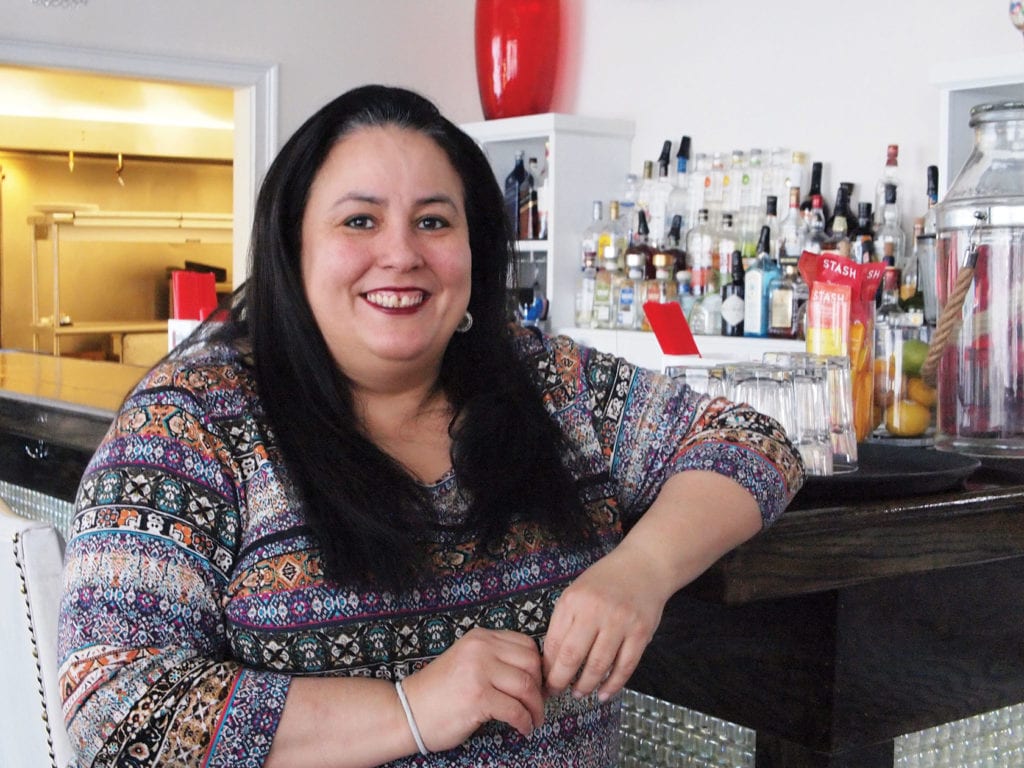Growth and survival in Rox
Roxbury restaurants respond to the changing neighborhood

Dwindling affordable housing isn’t the only issue affected by Roxbury’s spate of new developments: area restaurants, many of them minority-owned, are realizing mixed blessings as the neighborhood vastly changes around them.
The temporary closing of Haley House Cafe and the city’s selection of the planned JazzUrbane Cafe to fill the long-vacant 7,800-square-foot retail space in the Bruce Bolling Municipal Building underscore the challenges and opportunities facing local restaurateurs.
Well-known spots for community gathering, like Fort Hill Bar and Grill, Dudley Cafe, Dona Habana, Suya Joint, Darryl’s Corner Bar & Kitchen, Top Mix and more, are responding in different ways as new developments rise around them. Some owners have changed their entire business models to appeal to changing neighborhood demographics. While some of the small business owners feel the negative impact of rising rents on their community, others have seen their businesses benefit from an increase in customers.
Relaunching for success
Fort Hill Bar is one of Roxbury’s minority-owned and woman-owned restaurants, and owner Norvia Pena said she ultimately feels that new developments are beneficial to her business because of the increase in new luxury housing developments in the area. But Pena also can cite the 2017 renovation and re-launch of her business as a factor in her success.
Pena, who is originally from the Dominican Republic, took over the bar well over a decade ago. When she bought it, she said, the Latin-American restaurant on the corner of Washington Street and MLK Jr. Boulevard was one of the only businesses in sight. The restaurant struggled to find customers. But now, she says, the area is changing, and Pena said that’s great for her business.
“You have houses everywhere. They just built two wonderful buildings over there,” Pena says, pointing out the front window of her restaurant. “It’s getting good.”
Pena took over the restaurant in 2005. For years before that it had been a strictly Dominican Bar. Pena herself immigrated to the US from the Dominican Republic with her family when she was 11 years old.
Early on, Pena knew she wanted to revamp the business and create a neighborhood bar. She hired a consultant to walk her through the community process, to help her listen to Roxbury and see what they wanted. Through the process, she met with approximately 30 different people.
“Everybody said the same thing: They just want a nice place they can go and eat, they can have drinks, good food,” Pena said.
She invested in decorations to make the interior more inviting, renovated the foundation of the building, and hired a new chef to help her create menu items the community would want.
In 2017, she re-launched the restaurant. At the opening, Boston Mayor Marty Walsh was present and Boston’s Eater magazine covered the event. Since then, political candidates Ayanna Pressley, Liz Miranda, and Rachael Rollins all used the place for campaign events.
As for the community, Pena says that she caters to everybody, not just Dominicans.
“When you come, you can see a group of African Americans, a group of Latinos, a group of whites, and they’re all drinking, they’re all eating together,” Pena said. “When I see that, I feel really happy. I wanted to be an everybody bar, and it’s getting there.”
Mixed feelings on gentrification
The owners of Dona Habana, a Cuban-owned Cuban restaurant at Melnea Cass Boulevard and Mass. Avenue in Roxbury, also recalled getting extra help at the beginning. Co-owner Nivia Pina said organizations like the Boston Redevelopment Authority and Nuestra Comunidad Development Corporation offered assistance, including grants, for businesses to stay in the community.
“Things definitely got better over the years,” said Pina. “People love our product, so the better the area got, the better our business got.”
But Pina has conflicting feelings about how current Roxbury gentrification affects the area and its residents.
“It’s sad to see how people are leaving because they can’t pay their rents,” said Pina. “On another hand, new people are coming and new business is created. So I have mixed feelings.”
A café with a mission
Dudley Café in Dudley Square is another popular meeting place. Unlike Fort Hill Bar, it’s relatively new, having just opened in 2015. Another difference from Fort Hill Bar is that Dudley Café’s owners are very critical of gentrification in the neighborhood and citywide.
Biplaw Rai, the café’s managing partner, co-owner and co-founder, said he is angered by the other new developments in Roxbury. He said they cater to the wealthier newcomers to Roxbury, and generally aren’t for current residents, as new buildings’ rents are too high and restaurants are unwelcoming or expensive.
“I walk around the city and see all these new buildings and shiny stores. You hardly see people use it,” said Rai. “When they are [used], it’s by a select few, for a short amount of time. It’s like, why are we wasting millions of dollars if it’s not serving the community?”
He said that in Roxbury, people are more aware when local businesses change hands or when new businesses open, than in neighborhoods like Cambridge, Somerville, and Jamaica Plain, because Roxbury residents “have been through more changes.”
“They know what businesses come into the Square,” said Rai. “They know how they operate, if they are not giving back to the community, and vice versa.”
Because of that, Dudley Cafe attempts to give back in different ways. Rai, who worked in food service prior to opening the cafe, partnered with Roxbury resident Solmon Chowdhury who lived in the neighborhood for 30 years, and owns several other restaurants in Boston, to open Dudley Cafe. Both men are South Asian and said they wanted the space to serve the minority community of Roxbury.
Dudley Cafe maintains a strong social justice mission. The cafe names menu items after strong women, to remind people of “feminine power,” the owners say. They work to keep menu prices affordable, such as $5 for challah French toast or $2.50 for a bagel. They offer the space for nonprofits and groups like the Boston Cyclists Union, and never charge them to hold events there.
Rai said he makes sure that he gets to know the people coming into the cafe, so everyone feels welcome.
“It’s very easy for people to walk in and see like big glass windows, clean establishment, and have this mentality of like, ‘I don’t know if I really belong,’” said Rai. “It’s about feeling welcome.”
Rai said it’s not been “an easy ride” to make a profit or even to break even. Still, their commitment to the community maintains. When Dudley Cafe first opened, the owners reached out to local high school students, offering the students jobs first. “It was a paid gig, not an internship,” Rai emphasized.
A fair wage experiment
Rai cites Haley House Bakery Cafe, a nonprofit cafe nearby in Dudley Square, as “an inspiration.” Haley House opens up jobs to members of the community who face barriers to employment, such as having criminal records.
Bing Broderick, executive director of Haley House, spoke about Dudley Dough, a Haley House spinoff that opened in Dudley Square in October 2015 with a commitment to offer its employees a living wage.
However, with the fair wage program, which paid employees $15 per hour, Dudley Dough couldn’t break even, and the pizza shop closed in 2017.
Broderick also said many of his Haley House employees feel the [negative] impact of gentrification.
Dudley Café’s Rai admitted there is a lot he doesn’t have control over in Roxbury, but he is passionate about his business continuing to do what it can.
“Obviously we can’t change the fabric of what’s happening, as far as gentrification goes,” said Rai. “But our philosophy is, ‘Let’s make an impact in things that we have the power to.’”
This story was published via special arrangement with The Bay State Banner.






